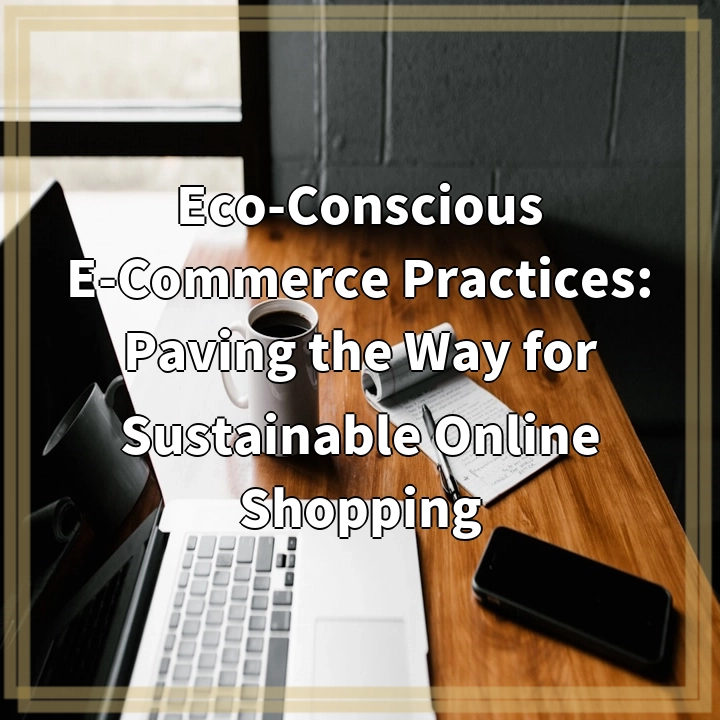
What it is:
Eco-conscious e-commerce practices refer to the strategies and actions taken by online retailers to minimize their environmental impact while delivering products to consumers. This approach encompasses a range of initiatives designed to promote sustainability, including using eco-friendly packaging, implementing energy-efficient warehousing processes, offering carbon-neutral shipping options, and sourcing products sustainably. By prioritizing ethical and environmentally responsible operations, these e-commerce businesses aim to appeal to socially conscious consumers who are increasingly seeking to make eco-friendly purchasing decisions.
real-world problems
Despite the growing interest in eco-conscious e-commerce practices, several real-world challenges hinder the widespread adoption of these initiatives. One significant issue is the difficulty in sourcing sustainable materials. Many online retailers struggle to find suppliers who can consistently provide eco-friendly alternatives without compromising quality or significantly increasing costs.
Supply Chain Transparency
Another challenge is supply chain transparency. Consumers are becoming more aware of the environmental and social implications of their purchases. However, many e-commerce platforms lack visibility into the sourcing and production processes of their products. Without transparent supply chains, it becomes challenging to verify the sustainability claims made by retailers, leading to consumer skepticism.
Consumer Awareness and Education
Additionally, there is a lack of consumer awareness and education surrounding eco-conscious practices. Many shoppers are not fully informed about the negative environmental impact of traditional e-commerce practices or the benefits of choosing eco-friendly options. This gap in knowledge can hinder demand for sustainable products and practices, making it difficult for businesses to justify the additional costs associated with greener alternatives.
Cost Factors
Cost is yet another barrier to the widespread implementation of eco-conscious e-commerce practices. Sustainable packaging options, energy-efficient technologies, and carbon-neutral shipping solutions often come with higher price tags. For many small and medium-sized enterprises (SMEs), these upfront costs can be prohibitive, leading them to prioritize profits over sustainability.
Logistical Challenges
Lastly, logistical challenges present significant hurdles. The rapid growth of e-commerce has led to increased demand for fast shipping, often resulting in higher carbon emissions due to expedited transport methods. Balancing the consumer expectation for quick delivery with eco-conscious practices poses a significant dilemma for many retailers looking to implement sustainable solutions.

Solutions to Eco-Conscious E-Commerce Challenges
To address the challenges associated with eco-conscious e-commerce practices, retailers can adopt a range of solutions aimed at fostering sustainability while meeting consumer expectations. These strategies focus on enhancing supply chain transparency, educating consumers, managing costs, and improving logistics.
Sustainable Sourcing
One effective solution is to establish partnerships with suppliers who prioritize sustainable materials and practices. By committing to ethical sourcing, retailers can ensure their products align with eco-conscious values and appeal to environmentally minded consumers. Building strong relationships with suppliers can also facilitate better communication about sustainability practices.
Enhancing Supply Chain Transparency
Retailers can invest in technologies that improve supply chain transparency, such as blockchain and traceability systems. These technologies allow businesses to track the origin of their materials and share this information with consumers, fostering trust and confidence in the sustainability of their products.
Consumer Education Initiatives
Educating consumers about the environmental impact of their purchasing decisions is crucial. Retailers can implement marketing campaigns that highlight the benefits of eco-conscious practices, share information about sustainability efforts, and promote the positive impact of choosing eco-friendly options.
Cost Management Strategies
To mitigate the higher costs often associated with sustainable practices, businesses can explore bulk purchasing agreements for eco-friendly materials, invest in energy-efficient technology, and streamline operations to reduce waste. Educating employees on sustainability can also promote a culture of cost-saving innovation.
Optimizing Logistics
Improving logistics can enhance the sustainability of e-commerce practices. Retailers can implement route optimization software to ensure efficient delivery, explore partnerships with eco-friendly carriers, and offer incentives for consumers who choose slower shipping options. By balancing speed with sustainability, e-commerce platforms can reduce their carbon footprint.















